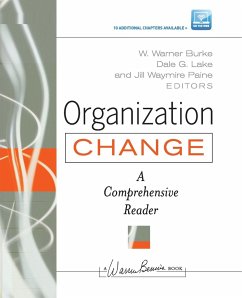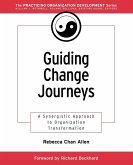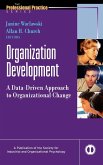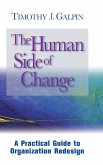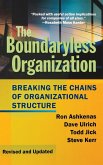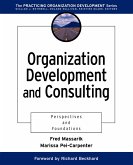Organization Change w/web
Herausgeber: Burke, W Warner; Waymire Paine, Jill; Lake, Dale G
Organization Change w/web
Herausgeber: Burke, W Warner; Waymire Paine, Jill; Lake, Dale G
- Broschiertes Buch
- Merkliste
- Auf die Merkliste
- Bewerten Bewerten
- Teilen
- Produkt teilen
- Produkterinnerung
- Produkterinnerung
Organization Change First published in 1961, the original four editions of The Planning of Change, co-edited by Warren Bennis, Kenneth D. Benne, and Robert Chin, provided the best compilations of readings at the time on a comparatively new field. In this updated version, focusing more on planned organization change, W. Warner Burke, Dale G. Lake, and Jill Waymire Paine take the four earlier editions to a new level and provide the most relevant, salient, and time-tested ideas that are considered the gold standard for an in-depth understanding of organization change. Each of the 75 articles…mehr
Andere Kunden interessierten sich auch für
![Guiding Change Journeys Guiding Change Journeys]() Rebecca Chan AllenGuiding Change Journeys54,99 €
Rebecca Chan AllenGuiding Change Journeys54,99 €![Web Marketing That Works Web Marketing That Works]() Adam FranklinWeb Marketing That Works25,99 €
Adam FranklinWeb Marketing That Works25,99 €![Organization Development Organization Development]() Organization Development100,99 €
Organization Development100,99 €![Organization Development Classics Organization Development Classics]() Organization Development Classics59,99 €
Organization Development Classics59,99 €![The Human Side of Change The Human Side of Change]() Timothy J GalpinThe Human Side of Change32,99 €
Timothy J GalpinThe Human Side of Change32,99 €![The Boundaryless Organization The Boundaryless Organization]() Ron AshkenasThe Boundaryless Organization34,99 €
Ron AshkenasThe Boundaryless Organization34,99 €![Organization Development and Consulting Organization Development and Consulting]() Fred MassarikOrganization Development and Consulting60,99 €
Fred MassarikOrganization Development and Consulting60,99 €-
-
-
Organization Change First published in 1961, the original four editions of The Planning of Change, co-edited by Warren Bennis, Kenneth D. Benne, and Robert Chin, provided the best compilations of readings at the time on a comparatively new field. In this updated version, focusing more on planned organization change, W. Warner Burke, Dale G. Lake, and Jill Waymire Paine take the four earlier editions to a new level and provide the most relevant, salient, and time-tested ideas that are considered the gold standard for an in-depth understanding of organization change. Each of the 75 articles included in this extraordinary volume has launched its own field of inquiry or practice and, together, are considered the key readings for any student or practitioner of organization change and development. Organization Change offers a unique collection of writings from the most prominent names in the field. Contributions to this volume include writings by such luminaries as: Billie Alban Chris Argyris Richard Beckhard Michael Beer Warren Bennis William Bridges Barbara Bunker Connie Gersick Larry Greiner Richard Hackman Gary Hamel Rosabeth Moss Kanter Jon Katzenbach Kurt Lewin Gareth Morgan James O'Toole Eric Trist Edgar Schein Don Schön Michael Tushman Karl Weick
Hinweis: Dieser Artikel kann nur an eine deutsche Lieferadresse ausgeliefert werden.
Hinweis: Dieser Artikel kann nur an eine deutsche Lieferadresse ausgeliefert werden.
Produktdetails
- Produktdetails
- Verlag: Wiley
- Seitenzahl: 1016
- Erscheinungstermin: 1. November 2008
- Englisch
- Abmessung: 235mm x 191mm x 54mm
- Gewicht: 1856g
- ISBN-13: 9780470260562
- ISBN-10: 0470260564
- Artikelnr.: 23557741
- Herstellerkennzeichnung
- Libri GmbH
- Europaallee 1
- 36244 Bad Hersfeld
- gpsr@libri.de
- Verlag: Wiley
- Seitenzahl: 1016
- Erscheinungstermin: 1. November 2008
- Englisch
- Abmessung: 235mm x 191mm x 54mm
- Gewicht: 1856g
- ISBN-13: 9780470260562
- ISBN-10: 0470260564
- Artikelnr.: 23557741
- Herstellerkennzeichnung
- Libri GmbH
- Europaallee 1
- 36244 Bad Hersfeld
- gpsr@libri.de
The Editors W. Warner Burke is Edward Lee Thorndike Professor of Psychology and Education at Teachers College, Columbia University. Dale G. Lake has worked as a consultant to more than fifty organizations including General Electric, Acco, AMOCO , HUD, Master Card International, Citicorp, and Conagra. Jill Waymire Paine teaches organizational psychology at Teachers College, Columbia University, and has worked as an organizational development consultant in a variety of for-profit and not-for-profit organizations.
Foreword xiii Preface xv PART ONE ENVIRONMENT AS STIMULUS FOR CHANGE 1 Editors' Interlude 1 The Causal Texture of Organizational Environments 7 F. E. Emery
E. L. Trist (1965) 2 Changing Organizations 21 W. G. Bennis (1966) 3 Survival and Performance in the Era of Discontinuity 35 R. N. Foster
S. Kaplan (2001) 4 Management and the Scientific Renaissance 51 R. Pascale
M. Millemann
L. Gioja (2000) PART TWO THEORIES AND MODELS OF PLANNED ORGANIZATION CHANGE 65 Editors' Interlude 5 Quasi-Stationary Social Equilibria and the Problem of Permanent Change 73 K. Lewin (1947) 6 The Mechanisms of Change 78 E. H. Schein (1964) 7 General Strategies for Effecting Changes in Human Systems 89 R. Chin
K. D. Benne (1967) 8 Toward a Theory of Motive Acquisition website (see p. xii) D. C. McClelland (1965) 9 Nature Intervenes: Organizations as Organisms website (see p. xii) G. Morgan (1997) 10 Sociotechnical Systems: Origin of the Concept 118 E. Trist (1981) 11 Evolution and Revolution as Organizations Grow website (see p. xii) L. E. Greiner (1998) 12 Revolutionary Change Theories: A Multilevel Exploration of the Punctuated Equilibrium Paradigm 144 C.J.G. Gersick (1991) 13 Organizational Evolution: A Metamorphosis Model of Convergence and Reorientation 174 M. L. Tushman
E. Romanelli (1985) 14 Organizational Change and Development website (see p. xii) K. E. Weick
R. E. Quinn (1999) 15 Kurt Lewin and the Planned Approach to Change: A Reappraisal 226 B. Burnes (2004) PART THREE DIAGNOSING THE CURRENT STATE 255 Editors' Interlude 16 Understanding Organizations: The Process of Diagnosis 259 W. W. Burke (1992) 17 A Causal Model of Organizational Performance and Change 273 W. W. Burke
G. H. Litwin (1992) 18 An Overview of Organizational Surveys 300 A. I. Kraut (1996) 19 Toward Integrated Organizational Diagnosis 312 A. Howard
Associates (1994) PART FOUR UNDERSTANDING RESISTANCE 331 Editors' Interlude The Nature of Resistance 20 Overcoming Resistance to Change 341 L. Coch
J.R.P. French, Jr. (1965) 21 Resistance to Change 364 G. Watson (1967) 22 A Theory of Psychological Reactance 377 J. W. Brehm (1966) 23 Change Resisted: Thirty-Three Hypotheses Why website (see p. xii) J. O'Toole (1995) Individual Response to Change 24 Managing Organizational Transitions 393 W. Bridges (1986) 25 The Recipients of Change 404 T. D. Jick (1990) 26 Rethinking Resistance and Recognizing Ambivalence: A Multidimensional View of Attitudes Toward an Organizational Change 418 S. K. Piderit (2000) Group Response to Change 27 A Theory of Group Development 441 W. G. Bennis
H. A. Shepard (1956) 28 The Work of Wilfred Bion on Groups 466 M. J. Rioch (1970) Organization Response to Change 29 Organizational Identity and Learning: A Psychodynamic Perspective 481 A. D. Brown
K. Starkey (2000) 30 The Quest for Resilience 512 G. Hamel
L. Vailikangas (2003) PART FIVE ORGANIZATION CHANGE INTERVENTIONS 533 Editors' Interlude 31 Strategies of Consultation 539 R. R. Blake
J. S. Mouton (1972) Individual-Level Change Interventions 32 Creating Readiness for Organizational Change 569 A. A. Armenakis, S. G. Harris
K. W. Mossholder (1993) 33 Selecting Personnel for a System 4 Organization website (see p. xii) D. King (1972) 34 Training and Development 590 W. W. Burke (1982) 35 Coaching Leaders in Transition: Lessons from the Field 599 R. Witherspoon
M. D. Cannon (2004) Group-Level Change Interventions 36 Team Building 629 W. W. Burke (1982) 37 What Is Process Consultation? 642 E. Schein (1999) 38 Dilemmas of Managing Participation website (see p. xii) R. M. Kanter (1983) 39 Understanding and Using Large System Interventions 667 B. B. Bunker
B. T. Alban (2002) Organization-Level Interventions 40 The Change Process: Why Change? 687 R. Beckhard
R. T. Harris (1987) 41 Creating a Climate and Culture for Sustainable Organizational Change website (see p. xii) B. Schneider, A. P. Brief
R. A. Guzzo (1996) 42 Interorganizational Relations 699 W. W. Burke
N. W. Biggart (1997) PART SIX KEY ROLES IN PLANNED ORGANIZATION CHANGE 733 Editors' Interlude 43 ''All We Like Sheep-'' (Isaiah 53:6): Followers and Leaders website (see p. xii) M. J. Rioch (1971) 44 Leading Organization Change 737 W. W. Burke (2008) 45 The Psychology of Self-Management in Organizations 762 J. R. Hackman (1986) 46 The Discipline of Teams website (see p. xii) J. R. Katzenbach
D. K. Smith (1993) PART SEVEN BUILDING KNOWLEDGE OF CHANGE THROUGH ASSESSMENT 809 Editors' Interlude 47 Short- and Long-Range Effects of a Team Development R. Beckhard
D. G. Lake (1971) Effort 813 48 Measuring Change and Persistence in Human Affairs: Types of Change Generated by OD Designs 834 R. T. Golembiewski.
K. Billingsley
S. Yeager (1976) 49 Explaining Development and Change in Organizations 859 A. H. Van de Ven
M. S. Poole (1995) 50 Organization Change and Development 893 M. Beer
A. E. Walton (1987) 51 A Complex-Systems Approach to Organizations 924 D. J. Svyantek
L. L. Brown (2000) 52 The Evolving Field of Organizational Learning 935 C. Argyris
D. A. Sch
n (1996) PART EIGHT SOME CONCLUSIONS AND FUTURE NEEDS 955 Editors' Interlude Names Index 959 Subject Index 976 Credits 991
E. L. Trist (1965) 2 Changing Organizations 21 W. G. Bennis (1966) 3 Survival and Performance in the Era of Discontinuity 35 R. N. Foster
S. Kaplan (2001) 4 Management and the Scientific Renaissance 51 R. Pascale
M. Millemann
L. Gioja (2000) PART TWO THEORIES AND MODELS OF PLANNED ORGANIZATION CHANGE 65 Editors' Interlude 5 Quasi-Stationary Social Equilibria and the Problem of Permanent Change 73 K. Lewin (1947) 6 The Mechanisms of Change 78 E. H. Schein (1964) 7 General Strategies for Effecting Changes in Human Systems 89 R. Chin
K. D. Benne (1967) 8 Toward a Theory of Motive Acquisition website (see p. xii) D. C. McClelland (1965) 9 Nature Intervenes: Organizations as Organisms website (see p. xii) G. Morgan (1997) 10 Sociotechnical Systems: Origin of the Concept 118 E. Trist (1981) 11 Evolution and Revolution as Organizations Grow website (see p. xii) L. E. Greiner (1998) 12 Revolutionary Change Theories: A Multilevel Exploration of the Punctuated Equilibrium Paradigm 144 C.J.G. Gersick (1991) 13 Organizational Evolution: A Metamorphosis Model of Convergence and Reorientation 174 M. L. Tushman
E. Romanelli (1985) 14 Organizational Change and Development website (see p. xii) K. E. Weick
R. E. Quinn (1999) 15 Kurt Lewin and the Planned Approach to Change: A Reappraisal 226 B. Burnes (2004) PART THREE DIAGNOSING THE CURRENT STATE 255 Editors' Interlude 16 Understanding Organizations: The Process of Diagnosis 259 W. W. Burke (1992) 17 A Causal Model of Organizational Performance and Change 273 W. W. Burke
G. H. Litwin (1992) 18 An Overview of Organizational Surveys 300 A. I. Kraut (1996) 19 Toward Integrated Organizational Diagnosis 312 A. Howard
Associates (1994) PART FOUR UNDERSTANDING RESISTANCE 331 Editors' Interlude The Nature of Resistance 20 Overcoming Resistance to Change 341 L. Coch
J.R.P. French, Jr. (1965) 21 Resistance to Change 364 G. Watson (1967) 22 A Theory of Psychological Reactance 377 J. W. Brehm (1966) 23 Change Resisted: Thirty-Three Hypotheses Why website (see p. xii) J. O'Toole (1995) Individual Response to Change 24 Managing Organizational Transitions 393 W. Bridges (1986) 25 The Recipients of Change 404 T. D. Jick (1990) 26 Rethinking Resistance and Recognizing Ambivalence: A Multidimensional View of Attitudes Toward an Organizational Change 418 S. K. Piderit (2000) Group Response to Change 27 A Theory of Group Development 441 W. G. Bennis
H. A. Shepard (1956) 28 The Work of Wilfred Bion on Groups 466 M. J. Rioch (1970) Organization Response to Change 29 Organizational Identity and Learning: A Psychodynamic Perspective 481 A. D. Brown
K. Starkey (2000) 30 The Quest for Resilience 512 G. Hamel
L. Vailikangas (2003) PART FIVE ORGANIZATION CHANGE INTERVENTIONS 533 Editors' Interlude 31 Strategies of Consultation 539 R. R. Blake
J. S. Mouton (1972) Individual-Level Change Interventions 32 Creating Readiness for Organizational Change 569 A. A. Armenakis, S. G. Harris
K. W. Mossholder (1993) 33 Selecting Personnel for a System 4 Organization website (see p. xii) D. King (1972) 34 Training and Development 590 W. W. Burke (1982) 35 Coaching Leaders in Transition: Lessons from the Field 599 R. Witherspoon
M. D. Cannon (2004) Group-Level Change Interventions 36 Team Building 629 W. W. Burke (1982) 37 What Is Process Consultation? 642 E. Schein (1999) 38 Dilemmas of Managing Participation website (see p. xii) R. M. Kanter (1983) 39 Understanding and Using Large System Interventions 667 B. B. Bunker
B. T. Alban (2002) Organization-Level Interventions 40 The Change Process: Why Change? 687 R. Beckhard
R. T. Harris (1987) 41 Creating a Climate and Culture for Sustainable Organizational Change website (see p. xii) B. Schneider, A. P. Brief
R. A. Guzzo (1996) 42 Interorganizational Relations 699 W. W. Burke
N. W. Biggart (1997) PART SIX KEY ROLES IN PLANNED ORGANIZATION CHANGE 733 Editors' Interlude 43 ''All We Like Sheep-'' (Isaiah 53:6): Followers and Leaders website (see p. xii) M. J. Rioch (1971) 44 Leading Organization Change 737 W. W. Burke (2008) 45 The Psychology of Self-Management in Organizations 762 J. R. Hackman (1986) 46 The Discipline of Teams website (see p. xii) J. R. Katzenbach
D. K. Smith (1993) PART SEVEN BUILDING KNOWLEDGE OF CHANGE THROUGH ASSESSMENT 809 Editors' Interlude 47 Short- and Long-Range Effects of a Team Development R. Beckhard
D. G. Lake (1971) Effort 813 48 Measuring Change and Persistence in Human Affairs: Types of Change Generated by OD Designs 834 R. T. Golembiewski.
K. Billingsley
S. Yeager (1976) 49 Explaining Development and Change in Organizations 859 A. H. Van de Ven
M. S. Poole (1995) 50 Organization Change and Development 893 M. Beer
A. E. Walton (1987) 51 A Complex-Systems Approach to Organizations 924 D. J. Svyantek
L. L. Brown (2000) 52 The Evolving Field of Organizational Learning 935 C. Argyris
D. A. Sch
n (1996) PART EIGHT SOME CONCLUSIONS AND FUTURE NEEDS 955 Editors' Interlude Names Index 959 Subject Index 976 Credits 991
Foreword xiii Preface xv PART ONE ENVIRONMENT AS STIMULUS FOR CHANGE 1 Editors' Interlude 1 The Causal Texture of Organizational Environments 7 F. E. Emery
E. L. Trist (1965) 2 Changing Organizations 21 W. G. Bennis (1966) 3 Survival and Performance in the Era of Discontinuity 35 R. N. Foster
S. Kaplan (2001) 4 Management and the Scientific Renaissance 51 R. Pascale
M. Millemann
L. Gioja (2000) PART TWO THEORIES AND MODELS OF PLANNED ORGANIZATION CHANGE 65 Editors' Interlude 5 Quasi-Stationary Social Equilibria and the Problem of Permanent Change 73 K. Lewin (1947) 6 The Mechanisms of Change 78 E. H. Schein (1964) 7 General Strategies for Effecting Changes in Human Systems 89 R. Chin
K. D. Benne (1967) 8 Toward a Theory of Motive Acquisition website (see p. xii) D. C. McClelland (1965) 9 Nature Intervenes: Organizations as Organisms website (see p. xii) G. Morgan (1997) 10 Sociotechnical Systems: Origin of the Concept 118 E. Trist (1981) 11 Evolution and Revolution as Organizations Grow website (see p. xii) L. E. Greiner (1998) 12 Revolutionary Change Theories: A Multilevel Exploration of the Punctuated Equilibrium Paradigm 144 C.J.G. Gersick (1991) 13 Organizational Evolution: A Metamorphosis Model of Convergence and Reorientation 174 M. L. Tushman
E. Romanelli (1985) 14 Organizational Change and Development website (see p. xii) K. E. Weick
R. E. Quinn (1999) 15 Kurt Lewin and the Planned Approach to Change: A Reappraisal 226 B. Burnes (2004) PART THREE DIAGNOSING THE CURRENT STATE 255 Editors' Interlude 16 Understanding Organizations: The Process of Diagnosis 259 W. W. Burke (1992) 17 A Causal Model of Organizational Performance and Change 273 W. W. Burke
G. H. Litwin (1992) 18 An Overview of Organizational Surveys 300 A. I. Kraut (1996) 19 Toward Integrated Organizational Diagnosis 312 A. Howard
Associates (1994) PART FOUR UNDERSTANDING RESISTANCE 331 Editors' Interlude The Nature of Resistance 20 Overcoming Resistance to Change 341 L. Coch
J.R.P. French, Jr. (1965) 21 Resistance to Change 364 G. Watson (1967) 22 A Theory of Psychological Reactance 377 J. W. Brehm (1966) 23 Change Resisted: Thirty-Three Hypotheses Why website (see p. xii) J. O'Toole (1995) Individual Response to Change 24 Managing Organizational Transitions 393 W. Bridges (1986) 25 The Recipients of Change 404 T. D. Jick (1990) 26 Rethinking Resistance and Recognizing Ambivalence: A Multidimensional View of Attitudes Toward an Organizational Change 418 S. K. Piderit (2000) Group Response to Change 27 A Theory of Group Development 441 W. G. Bennis
H. A. Shepard (1956) 28 The Work of Wilfred Bion on Groups 466 M. J. Rioch (1970) Organization Response to Change 29 Organizational Identity and Learning: A Psychodynamic Perspective 481 A. D. Brown
K. Starkey (2000) 30 The Quest for Resilience 512 G. Hamel
L. Vailikangas (2003) PART FIVE ORGANIZATION CHANGE INTERVENTIONS 533 Editors' Interlude 31 Strategies of Consultation 539 R. R. Blake
J. S. Mouton (1972) Individual-Level Change Interventions 32 Creating Readiness for Organizational Change 569 A. A. Armenakis, S. G. Harris
K. W. Mossholder (1993) 33 Selecting Personnel for a System 4 Organization website (see p. xii) D. King (1972) 34 Training and Development 590 W. W. Burke (1982) 35 Coaching Leaders in Transition: Lessons from the Field 599 R. Witherspoon
M. D. Cannon (2004) Group-Level Change Interventions 36 Team Building 629 W. W. Burke (1982) 37 What Is Process Consultation? 642 E. Schein (1999) 38 Dilemmas of Managing Participation website (see p. xii) R. M. Kanter (1983) 39 Understanding and Using Large System Interventions 667 B. B. Bunker
B. T. Alban (2002) Organization-Level Interventions 40 The Change Process: Why Change? 687 R. Beckhard
R. T. Harris (1987) 41 Creating a Climate and Culture for Sustainable Organizational Change website (see p. xii) B. Schneider, A. P. Brief
R. A. Guzzo (1996) 42 Interorganizational Relations 699 W. W. Burke
N. W. Biggart (1997) PART SIX KEY ROLES IN PLANNED ORGANIZATION CHANGE 733 Editors' Interlude 43 ''All We Like Sheep-'' (Isaiah 53:6): Followers and Leaders website (see p. xii) M. J. Rioch (1971) 44 Leading Organization Change 737 W. W. Burke (2008) 45 The Psychology of Self-Management in Organizations 762 J. R. Hackman (1986) 46 The Discipline of Teams website (see p. xii) J. R. Katzenbach
D. K. Smith (1993) PART SEVEN BUILDING KNOWLEDGE OF CHANGE THROUGH ASSESSMENT 809 Editors' Interlude 47 Short- and Long-Range Effects of a Team Development R. Beckhard
D. G. Lake (1971) Effort 813 48 Measuring Change and Persistence in Human Affairs: Types of Change Generated by OD Designs 834 R. T. Golembiewski.
K. Billingsley
S. Yeager (1976) 49 Explaining Development and Change in Organizations 859 A. H. Van de Ven
M. S. Poole (1995) 50 Organization Change and Development 893 M. Beer
A. E. Walton (1987) 51 A Complex-Systems Approach to Organizations 924 D. J. Svyantek
L. L. Brown (2000) 52 The Evolving Field of Organizational Learning 935 C. Argyris
D. A. Sch
n (1996) PART EIGHT SOME CONCLUSIONS AND FUTURE NEEDS 955 Editors' Interlude Names Index 959 Subject Index 976 Credits 991
E. L. Trist (1965) 2 Changing Organizations 21 W. G. Bennis (1966) 3 Survival and Performance in the Era of Discontinuity 35 R. N. Foster
S. Kaplan (2001) 4 Management and the Scientific Renaissance 51 R. Pascale
M. Millemann
L. Gioja (2000) PART TWO THEORIES AND MODELS OF PLANNED ORGANIZATION CHANGE 65 Editors' Interlude 5 Quasi-Stationary Social Equilibria and the Problem of Permanent Change 73 K. Lewin (1947) 6 The Mechanisms of Change 78 E. H. Schein (1964) 7 General Strategies for Effecting Changes in Human Systems 89 R. Chin
K. D. Benne (1967) 8 Toward a Theory of Motive Acquisition website (see p. xii) D. C. McClelland (1965) 9 Nature Intervenes: Organizations as Organisms website (see p. xii) G. Morgan (1997) 10 Sociotechnical Systems: Origin of the Concept 118 E. Trist (1981) 11 Evolution and Revolution as Organizations Grow website (see p. xii) L. E. Greiner (1998) 12 Revolutionary Change Theories: A Multilevel Exploration of the Punctuated Equilibrium Paradigm 144 C.J.G. Gersick (1991) 13 Organizational Evolution: A Metamorphosis Model of Convergence and Reorientation 174 M. L. Tushman
E. Romanelli (1985) 14 Organizational Change and Development website (see p. xii) K. E. Weick
R. E. Quinn (1999) 15 Kurt Lewin and the Planned Approach to Change: A Reappraisal 226 B. Burnes (2004) PART THREE DIAGNOSING THE CURRENT STATE 255 Editors' Interlude 16 Understanding Organizations: The Process of Diagnosis 259 W. W. Burke (1992) 17 A Causal Model of Organizational Performance and Change 273 W. W. Burke
G. H. Litwin (1992) 18 An Overview of Organizational Surveys 300 A. I. Kraut (1996) 19 Toward Integrated Organizational Diagnosis 312 A. Howard
Associates (1994) PART FOUR UNDERSTANDING RESISTANCE 331 Editors' Interlude The Nature of Resistance 20 Overcoming Resistance to Change 341 L. Coch
J.R.P. French, Jr. (1965) 21 Resistance to Change 364 G. Watson (1967) 22 A Theory of Psychological Reactance 377 J. W. Brehm (1966) 23 Change Resisted: Thirty-Three Hypotheses Why website (see p. xii) J. O'Toole (1995) Individual Response to Change 24 Managing Organizational Transitions 393 W. Bridges (1986) 25 The Recipients of Change 404 T. D. Jick (1990) 26 Rethinking Resistance and Recognizing Ambivalence: A Multidimensional View of Attitudes Toward an Organizational Change 418 S. K. Piderit (2000) Group Response to Change 27 A Theory of Group Development 441 W. G. Bennis
H. A. Shepard (1956) 28 The Work of Wilfred Bion on Groups 466 M. J. Rioch (1970) Organization Response to Change 29 Organizational Identity and Learning: A Psychodynamic Perspective 481 A. D. Brown
K. Starkey (2000) 30 The Quest for Resilience 512 G. Hamel
L. Vailikangas (2003) PART FIVE ORGANIZATION CHANGE INTERVENTIONS 533 Editors' Interlude 31 Strategies of Consultation 539 R. R. Blake
J. S. Mouton (1972) Individual-Level Change Interventions 32 Creating Readiness for Organizational Change 569 A. A. Armenakis, S. G. Harris
K. W. Mossholder (1993) 33 Selecting Personnel for a System 4 Organization website (see p. xii) D. King (1972) 34 Training and Development 590 W. W. Burke (1982) 35 Coaching Leaders in Transition: Lessons from the Field 599 R. Witherspoon
M. D. Cannon (2004) Group-Level Change Interventions 36 Team Building 629 W. W. Burke (1982) 37 What Is Process Consultation? 642 E. Schein (1999) 38 Dilemmas of Managing Participation website (see p. xii) R. M. Kanter (1983) 39 Understanding and Using Large System Interventions 667 B. B. Bunker
B. T. Alban (2002) Organization-Level Interventions 40 The Change Process: Why Change? 687 R. Beckhard
R. T. Harris (1987) 41 Creating a Climate and Culture for Sustainable Organizational Change website (see p. xii) B. Schneider, A. P. Brief
R. A. Guzzo (1996) 42 Interorganizational Relations 699 W. W. Burke
N. W. Biggart (1997) PART SIX KEY ROLES IN PLANNED ORGANIZATION CHANGE 733 Editors' Interlude 43 ''All We Like Sheep-'' (Isaiah 53:6): Followers and Leaders website (see p. xii) M. J. Rioch (1971) 44 Leading Organization Change 737 W. W. Burke (2008) 45 The Psychology of Self-Management in Organizations 762 J. R. Hackman (1986) 46 The Discipline of Teams website (see p. xii) J. R. Katzenbach
D. K. Smith (1993) PART SEVEN BUILDING KNOWLEDGE OF CHANGE THROUGH ASSESSMENT 809 Editors' Interlude 47 Short- and Long-Range Effects of a Team Development R. Beckhard
D. G. Lake (1971) Effort 813 48 Measuring Change and Persistence in Human Affairs: Types of Change Generated by OD Designs 834 R. T. Golembiewski.
K. Billingsley
S. Yeager (1976) 49 Explaining Development and Change in Organizations 859 A. H. Van de Ven
M. S. Poole (1995) 50 Organization Change and Development 893 M. Beer
A. E. Walton (1987) 51 A Complex-Systems Approach to Organizations 924 D. J. Svyantek
L. L. Brown (2000) 52 The Evolving Field of Organizational Learning 935 C. Argyris
D. A. Sch
n (1996) PART EIGHT SOME CONCLUSIONS AND FUTURE NEEDS 955 Editors' Interlude Names Index 959 Subject Index 976 Credits 991

